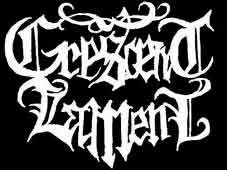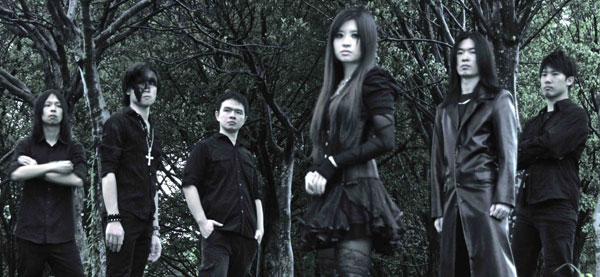
:: BANDAS | BANDS
CRESCENT LAMENT


CONTACTO | CONTACT
País | Country: TAIWÁN | TAIWAN
Estatus | Status: ACTIVO
Fecha de registro | Register date: 2011-11-08
LINE-UP
Muer - Vocals
Heven - Violin
Warose - Keyboard
Wat - Guitar
Taur - Guitar
Wick - Bass
Komet - Drums
DISCOGRAFÍA | DISCOGRAPHY
2011 - Behind the Lethal DeceitBIOGRAFÍA | BIOGRAPHY
BIOGRAPHY 2011
Founded on 28 February 2007, Crescent Lament—a band that was specially mentioned and recommended by heavy metal band Chthonic’s leader Doris in an exclusive interview published by the magazine Terrorizer in 2011—aims to become the iconic Gothic metal band of the island country of Taiwan in East Asia.
Crescent Lament: a rare Gothic metal band in Taiwan
Some people may have the question in mind that “why would Crescent Lament chose to become a Gothic metal band when Taiwan doesn’t have a tradition in Gothic music?” Well, Komet, Crescent Lament’s drummer—who is also an attending doctor at a medical center in Taiwan—answers this question.
“Taiwan has been a country with troubled history. In past centuries, she had been ruled by several bloodthirsty colonial powers and have been through exploitations by authoritarian regimes, making her an island filled with sorrow from historical conflicts,” Komet explains. “Although Taiwan may appear to be a civilized and free society, she is still deeply troubled by ethnic tensions that resulted from repression and manipulation of the past. More over, while Taiwan has long been a sovereign and independent state, it is still rejected by the United Nations due to continuous threats from China, and the 2.3 million free people are still orphans in the international community.”
“Long faced with conflicts in history, ethnic tensions, and national identity crisis, don’t you think it’s a great idea that Crescent Lament shows these deeply suppressed negative emotions with Gothic metal music?” Komet said.
Crescent Lament: what’s behind the name?
It’s noteworthy to mention that Crescent Lament was founded on 28 February, the National Peace Day of Taiwan, designated to commemorate the “228 Massacre” that occurred in 1947. During the largest-scale massacre in Taiwan’s modern history, tens of thousands Taiwanese were brutally murdered by government troops as they protested government corruptions. Following the massacre, Martial Law was declared and lasted for decades so that the government could better control the people. The period of time during which people were deprived of their freedoms of expression and of thought later came to be known as the “White Terror Era”.
“During the past century, Taiwan was trapped under the dark history of the 228 Massacre and the White Terror. It was not until the recent two decades that the Taiwanese were able to leave behind the sorrowful past after the Martial Law was lifted,” said Muer, the lead vocalist of Crescent Lament, and a counseling psychologist. “Although there is still some way to go before we could achieve genuine ethnic harmony, the morning has broken. Just because of Taiwan’s unique historic background, Crescent Lament hopes to recount the little bit of lamentable expectations in the dark but beautiful atmosphere that Gothic metal creates.”
“This is what Crescent Lament is all about—the feeble light of the crescent moon is the last bit of hope that people could rely on in the quiet and dark night filled with negative emotions,” Muer said.
Crescent Lament: Members and History
Cold, dark, but beautiful voice of the its vocalist Muer, accompanied by sounds of violin and keyboard from its skillful violinist Heven and keyboardist Warose, Crescent Lament presents to listeners aesthetic melodies with a touch of grief. The music is further enhanced with a somber yet exciting rhythm created by guitarists Wat and Taur, as well as the bassist Wick under the lead of the drummer Komet.
Members of Crescent Lament all come from different walks of life—a physician, a counseling psychologist, an electric engineer, a business manager, and musical engineer. While most of the members are not fulltime musicians, they deliver sparking music with their diehard passion for Gothic metal.
Since its creation, Crescent Lament has taken part in several large music festivals in Taiwan, including the Whale fight-Round 2 and Formoz Festival in 2008, and was invited to perform as the opening band in Lacrimosa Sehnsucht World Tour Live in Taipei and Chthonic’s World Tour in Taipei in 2009. In order to deliver to the world Taiwan’s own Gothic metal, Crescent Lament has insisted on writing their music in English. After releasing two singles, Crescent Lament and The Forgotten Winter, the band released it first all-English album Behind the Lethal Deceit in November 2011.
Crescent Lament’s first album: Behind the Lethal Deceit
Composed by the drummer Komet, and recorded by the keyboardist Warose, the band spent two years creating the album Behind the Lethal Deceit, and another year in recording it. “As I’ve mentioned before, Taiwan is a sovereign state that is constantly under China’s threat not only diplomatically but also militarily—at the moment, China has deployed over 1,400 missiles aiming at this free island nation, and never abandoned its intention to invade Taiwan,” Komet said while speaking on the idea behind the band’s first album. “After having been through the bloody massacre by a regime from China in the 228 Massacre in 1947, and once lost the freedoms of speech and of thought, the Taiwanese today would absolutely not want to repeat the dark history. Peace, anti-war, and defending freedom have become shared values among the Taiwanese.”
“The wars among former Yugoslav republics have left a deep impression in my mind, because what happened in former Yugoslavia was quite similar to the situations in Taiwan. First of all, the wars were triggered by complicated history behind, fueled with ethnic tensions and calls for self-determination. Secondly, the state that holds dominant military power always wants to answer the calls for self-determination with military forces. It was, however, ironic that the state with the strongest military power that ended in total failure and collapse under international sanctions, and it’s always the people—whichever country they live in—that suffer the most in wars because of the actions of dictators and politicians,” Komet said. He went on to elaborate that, for him “anti-war” is not an imaginative slogan, “rather, it’s an issue that's closely related to the 2.3 million free people of Taiwan.”
“The repeated slaughters in the wars in former Yugoslavia inspired me to write a sorrowful story of war for the album Behind the Lethal Deceit; and through the impression of total annihilation presented in the music, I hope to make listeners reflect on the foolishness of violence, and the pricelessness of harmonious coexistence,” Komet said. “The cover image of the album also tries to deliver the message behind—when the statue praising the war has collapsed, and everything has terminated with silence and death, the authority that relies on military might will only end in destruction, leaving behind merely the young people deceived by the dictator struggling to escape death in a foreign land afar.”
BANDAS | BANDS
HOLY NOISE @ DAILYMOTION
HOLY NOISE RADIO
PROMO ON-LINE
NOTICIAS | NEWS
Crescent Lament 2012 Promotional Video
[2012-01-08]
[2012-01-08]
LET'S SUPPORT THE UNDERGROUND #SupportTheUderground
- Catalysis - The Only Way Out Is Through (Official Music Video)
- RIPIO - Esquivando La Trampa (Official Video)
- VULVECTOMY - Analsphyxiation (Single 2025 - Video)
- PYTHIA - Path Of Decay (Single 2025 - Video)
- SKYFORGER - 30th Anniversary Tour 2025
- THE AWAKENING - Haunting Tour 2025
- RIPIO - Esquivando La Trampa (Official Video)
- VULVECTOMY - Analsphyxiation (Single 2025 - Video)
- PYTHIA - Path Of Decay (Single 2025 - Video)
- SKYFORGER - 30th Anniversary Tour 2025
- THE AWAKENING - Haunting Tour 2025
1999-2025 @ HOLY NOISE
MILADY NOISE
milady@holynoise.com